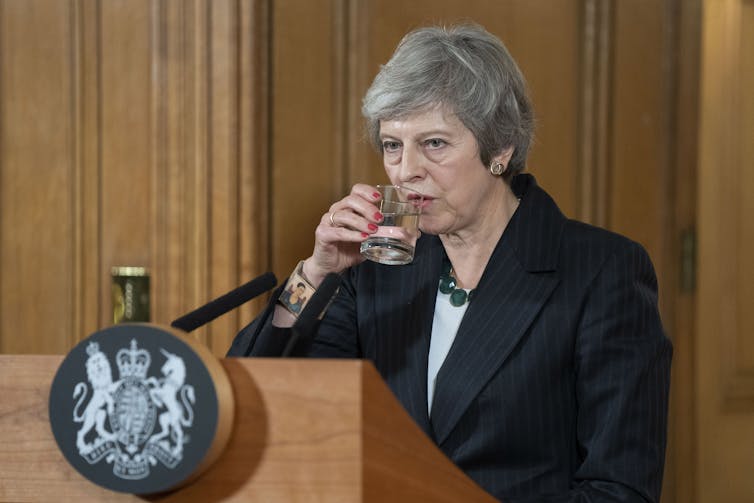The Brexit mess could lead to a break-up of a no longer United Kingdom
- Written by Ben Wellings, Senior Lecturer in Politics and International Relations, Monash University
Behind the scenes at Westminster and the teetering fate of the British government lies an even more profound change in British politics: the very real possibility of the break-up of the United Kingdom.
In this situation Australia needs to tread carefully and maintain its good relations with what has emerged as its more stable European partner, the European Union, while offering silent support for whatever governments or countries could emerge from Brexit.
Is the UK headed for dissolution?
The United Kingdom is made up of England, Wales, Scotland and Northern Ireland.
The publication of the Brexit draft withdrawal agreement - a hefty 585-page tome - has revealed what has been implicit in the “British” vote to leave the EU all along: that Brexit is an expression of English nationalism that will unwittingly lead to the break-up of the UK.
Read more: Brexit deal: how UK and EU got here and what happens next
Behind the government’s rhetoric of “global Britain”, there is no such thing as the “British people” in a political sense any more. The referendum revealed significant divisions between attitudes to EU membership in Scotland, Northern Ireland and England. While Prime Minister Theresa May tried to reposition “global Britain” in relation to Europe and the rest of the world, Britain itself dissolved from within.
Prime Minister Theresa May refers to the UK as a “precious union”. If only more people felt the same. An LBC-YouGov poll in March found that a majority of (mostly English) voters wanted to leave the EU rather than keep Northern Ireland in the UK.
In October, research published by the Centre on Constitutional Change showed that a clear majority of English leave voters would be happy to see Scotland and Northern Ireland out of the UK as the price of Brexit.
The irony is that it is the resistance of 10 MPs from the Ulster loyalist Democratic Unionist Party (DUP) and about 60 hard-line English Conservative Brexiteersis most likely to plunge the UK into an existential crisis. Their intransigence will destroy the thing they profess to defend.
Read more: As Brexit begins, Australia mustn’t get caught up in Britain’s post-imperial fantasies
The text of the Brexit draft withdrawal agreement was at pains to appease concerns among the Ulster unionist community about maintaining the integrity of the UK (unsuccessfully as it turned out).
The prospect of the agreed backstop – a single customs territory that the UK could not leave without EU consent and which would ultimately keep Northern Ireland in a special relationship with the EU after Brexit – was not something Brexiteers and the DUP could stomach.
For them, the deal was a “capitulation”. It was a breach of “blood red” lines that invoked the prospect of a return to conflict in Ulster.
Across the Irish Sea, Nicola Sturgeon, the Scottish first minister, asked: if Northern Ireland got special treatment, why not Scotland too?
In fact, the withdrawal agreement made no mention of Scotland at all. This disregard for the overwhelming Scottish vote to remain in the EU has pushed Scotland closer to another referendum on independence.
 Brexit has divided opinion across Britain long after the 2016 vote to leave the European Union.
Neil Hall/EPA
Brexit has divided opinion across Britain long after the 2016 vote to leave the European Union.
Neil Hall/EPA
Brexit has created a new and deep cleavage in British politics that cuts across old political divisions. Far fewer people identify as Labour or Conservative than identify as “leave” or “remain”.
Add the national dimension to this politics and some new options emerge. Some hard Brexiteers must be considering ditching Scotland and Northern Ireland as an acceptable cost for “British” (read “English”) independence from the EU.
The ghost of empire has haunted the Brexit imaginary from before the 2016 referendum. Its critics derided “global Britain” as “Empire 2.0”. But the memory of empire cuts two ways. Brexiteers see the EU as a threatening imperium. The withdrawal agreement would leave the UK as a vassal state - a state that is subordinate to another - and therefore must be rejected.
Read more: Brexit draft withdrawal agreement – experts react
Would a second referendum help?
Brexit has also left unresolved questions about who is actually in charge in Britain. Calls for a second referendum have grown, suggesting “the people” rather than government or parliament is the ultimate source of authority on this matter.
A second referendum has the advantage of presenting the electorate with a concrete proposal for leaving. It would temper the unrealistic and downright false claims of the leave campaign in 2016. It might end the talk of “respecting the wishes of the British people” to leave the EU.
In truth we don’t really know what exactly people voted for: only 6% of leave voters said they thought Britain would be better off economically by leaving.
But a general election would be a better bet. It would effectively be a referendum on the deal. It might also return a government with a majority – something Britain has lacked since May’s miscalculation last year.
 Theresa May has spent much of her time navigating Brexit since she became prime minister following the referendum.
David Levenson/EPA
Theresa May has spent much of her time navigating Brexit since she became prime minister following the referendum.
David Levenson/EPA
Australia’s role
What does this mean for Australia? Australia was name-checked in Prime Minister’s Questions on Wednesday as a country offering the prospect of a quick free trade agreement. Britain needs Australia in a way that it hasn’t since world war two. It would be best at this delicate moment to stop recklessly encouraging the British government from the sidelines: no more talk of one-page free trade agreements.
Australia must continue with its (slow) progress on the Australia-EU free trade agreement negotiations begun in June. The EU has remained remarkably unified during the Brexit negotiations despite tensions of its own. The EU is coming out of its own crises of the past decade. Now it’s Britain’s turn to teeter on the brink of disintegration.
Authors: Ben Wellings, Senior Lecturer in Politics and International Relations, Monash University





